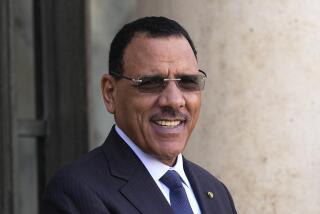Egyptian military contends with Sinai violence, cuts in U.S. aid
CAIRO -- An explosion ripped through a checkpoint in Egypt’s restive Sinai Peninsula on Thursday, killing three soldiers and a police officer, while Egyptian officials sought to put the best face on a U.S. move to cut hundreds of millions of dollars in military assistance.
Meanwhile, Egyptian authorities said two Canadian nationals who were jailed for seven weeks and released this week were free to leave the country. Filmmaker John Greyson and physician Tarek Loubani were arrested in mid-August during a government crackdown on followers of the Muslim Brotherhood, who were demanding the reinstatement of ousted president Mohamed Morsi.
The two had described harsh conditions in jail, and the case became an embarrassment for Egyptian officials. The men had hoped to board a flight out within hours of their release early Sunday, but were prevented from doing so.
Egypt’s military campaign in Sinai, which has intensified in the last month, targets Islamist militant groups that the government says became entrenched in the peninsula during Morsi’s yearlong rule. The Islamist president was overthrown July 3 and is now facing trial.
Thursday’s blast, which also left four members of the security forces injured, took place near El Arish, an area of northern Sinai that has been the scene of frequent clashes between militants and police and soldiers.
Counter-terrorism efforts in Sinai are among the measures that are to be spared in the U.S. military-aid cuts, which were announced Wednesday in Washington.
“This decision is taken at a time when we are facing terrorism,” said Badr Atty, an Egyptian Foreign Ministry spokesman. “We think it’s an incorrect decision, but the U.S. is committed to preserving and maintaining a longstanding partnership with Egypt. It’s a temporary decision.”
Operations in Sinai are a highly sensitive issue for Egyptian authorities. A prominent Egyptian journalist working there was recently imprisoned for a month and handed a suspended six-month suspended sentence after the army accused him of lying about its activities and traveling without permission into a closed military zone.
The peninsula is the scene of near-daily violence. On Wednesday, four soldiers were hurt when their vehicle drove past a roadside bomb, Egyptian authorities said. That same day, a bomb went off in a military intelligence office in Rafah, bordering the Gaza Strip, but the office was empty at the time.
The aid reduction to the Egyptian military affects deliveries of weaponry and cash assistance -- a punitive step aimed at expressing Washington’s disapproval for the wide-ranging crackdown on Morsi’s Muslim Brotherhood over the last three months. Nearly all of the organization’s top leaders are in jail, and others are fugitives.
Egypt’s interim government has pledged to carry out a democratic transition, including elections and a rewrite of the constitution, but the country’s de facto leader, Gen. Abdel Fattah Sisi, is being urged by some to run for president. Critics say that would hamper efforts to move toward a genuine democracy.
Morsi, the country’s first democratically elected president, is to go on trial on Nov. 4 on charges of inciting the killing of political opponents. His lawyers say the charges are fabricated.
ALSO:
Malala Yousafzai wins EU human rights prize
In Mexico custody battles, high-profile fathers gain an edge
Libyan prime minister abducted, freed; militia cites U.S. raid
More to Read
Sign up for Essential California
The most important California stories and recommendations in your inbox every morning.
You may occasionally receive promotional content from the Los Angeles Times.










